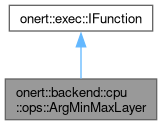Loading...
Searching...
No Matches
onert::backend::cpu::ops::ArgMinMaxLayer Class Reference
#include <ArgMinMaxLayer.h>
Collaboration diagram for onert::backend::cpu::ops::ArgMinMaxLayer:

Public Member Functions | |
| ArgMinMaxLayer () | |
| void | configure (const IPortableTensor *indices, IPortableTensor *output, const IPortableTensor *axis, bool is_arg_max) |
| void | run () override |
 Public Member Functions inherited from onert::exec::IFunction Public Member Functions inherited from onert::exec::IFunction | |
| virtual | ~IFunction ()=default |
| virtual void | prepare () |
Detailed Description
Definition at line 27 of file ArgMinMaxLayer.h.
Constructor & Destructor Documentation
◆ ArgMinMaxLayer()
|
inline |
Definition at line 30 of file ArgMinMaxLayer.h.
30: _input(nullptr), _output(nullptr), _axis(nullptr), _is_arg_max(true) {}
Member Function Documentation
◆ configure()
| void onert::backend::cpu::ops::ArgMinMaxLayer::configure | ( | const IPortableTensor * | indices, |
| IPortableTensor * | output, | ||
| const IPortableTensor * | axis, | ||
| bool | is_arg_max | ||
| ) |
Definition at line 67 of file ArgMinMaxLayer.cc.
◆ run()
|
overridevirtual |
Implements onert::exec::IFunction.
Definition at line 76 of file ArgMinMaxLayer.cc.
77{
79 {
80 throw std::runtime_error("ArgMinMax: wrong shape of axis");
81 }
82 auto axis = *getBuffer<int32_t>(_axis);
83 if (axis < 0)
84 {
85 axis += _input->getShape().rank();
86 }
87#define TF_LITE_ARG_MIN_MAX(input_type, axis_type, output_type) \
88 ArgMinMax(getShape(_input), getBuffer<input_type>(_input), getShape(_output), \
89 getBuffer<output_type>(_output), axis, GetComparefunction<input_type>(_is_arg_max));
91 {
93 {
94 case ir::DataType::FLOAT32:
96 break;
97 case ir::DataType::QUANT_UINT8_ASYMM:
98 case ir::DataType::UINT8:
99 TF_LITE_ARG_MIN_MAX(uint8_t, int32_t, int32_t);
100 break;
101 case ir::DataType::QUANT_INT8_ASYMM:
102 TF_LITE_ARG_MIN_MAX(uint8_t, int32_t, int32_t);
103 break;
104 case ir::DataType::INT32:
105 TF_LITE_ARG_MIN_MAX(int32_t, int32_t, int32_t);
106 break;
107 default:
108 throw std::runtime_error("ArgMinMax: unsupported data type");
109 }
110 }
112 {
114 {
115 case ir::DataType::FLOAT32:
117 break;
118 case ir::DataType::QUANT_UINT8_ASYMM:
119 case ir::DataType::UINT8:
120 TF_LITE_ARG_MIN_MAX(uint8_t, int32_t, int64_t);
121 break;
122 case ir::DataType::QUANT_INT8_ASYMM:
123 TF_LITE_ARG_MIN_MAX(uint8_t, int32_t, int64_t);
124 break;
125 case ir::DataType::INT32:
126 TF_LITE_ARG_MIN_MAX(int32_t, int32_t, int64_t);
127 break;
128 default:
129 throw std::runtime_error("ArgMinMax: unsupported data type");
130 }
131 }
132 else
133 {
134 throw std::runtime_error("ArgMinMax: unsupported data type");
135 }
136
137#undef TF_LITE_ARG_MIN_MAX
138}
#define TF_LITE_ARG_MIN_MAX(input_type, axis_type, output_type)
size_t total_size() const override final
Definition IPortableTensor.h:52
ir::DataType data_type() const override final
Definition IPortableTensor.h:54
References onert::backend::IPortableTensor::data_type(), onert::backend::IPortableTensor::getShape(), TF_LITE_ARG_MIN_MAX, and onert::backend::IPortableTensor::total_size().
The documentation for this class was generated from the following files:
- runtime/onert/backend/cpu/ops/ArgMinMaxLayer.h
- runtime/onert/backend/cpu/ops/ArgMinMaxLayer.cc